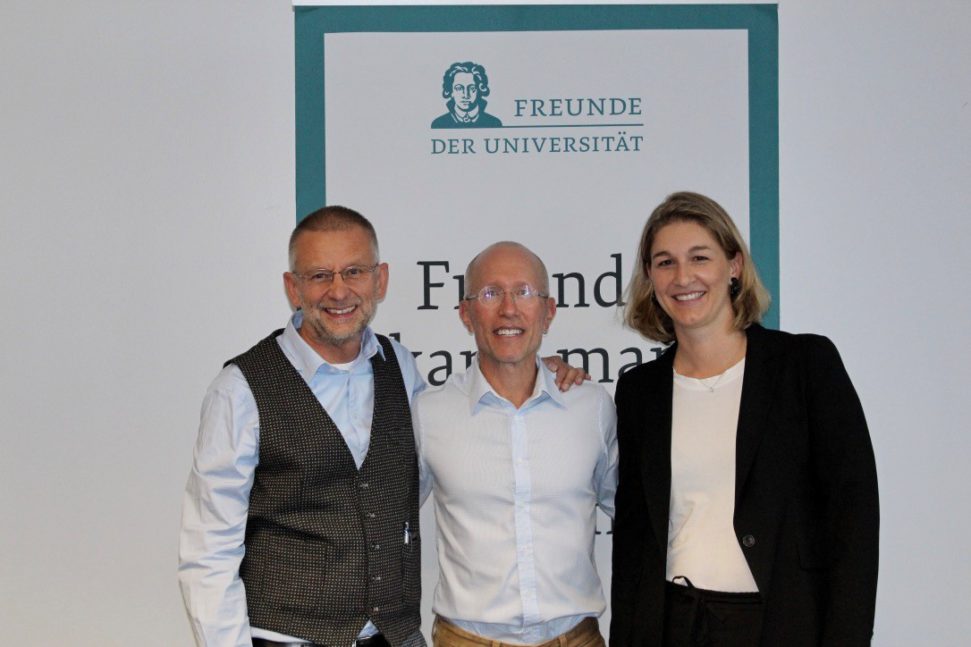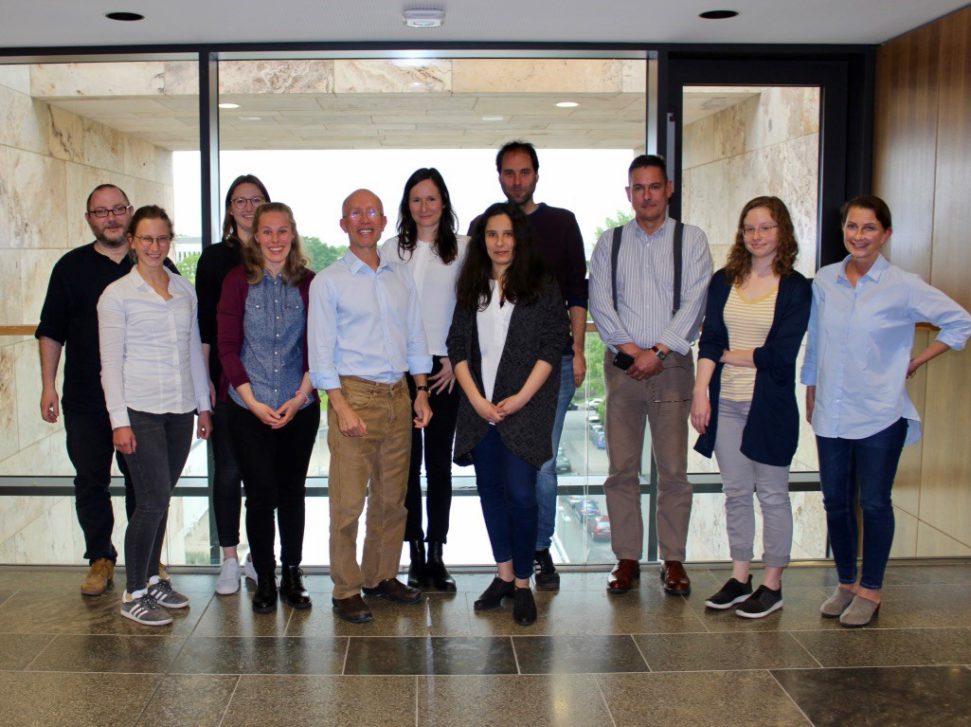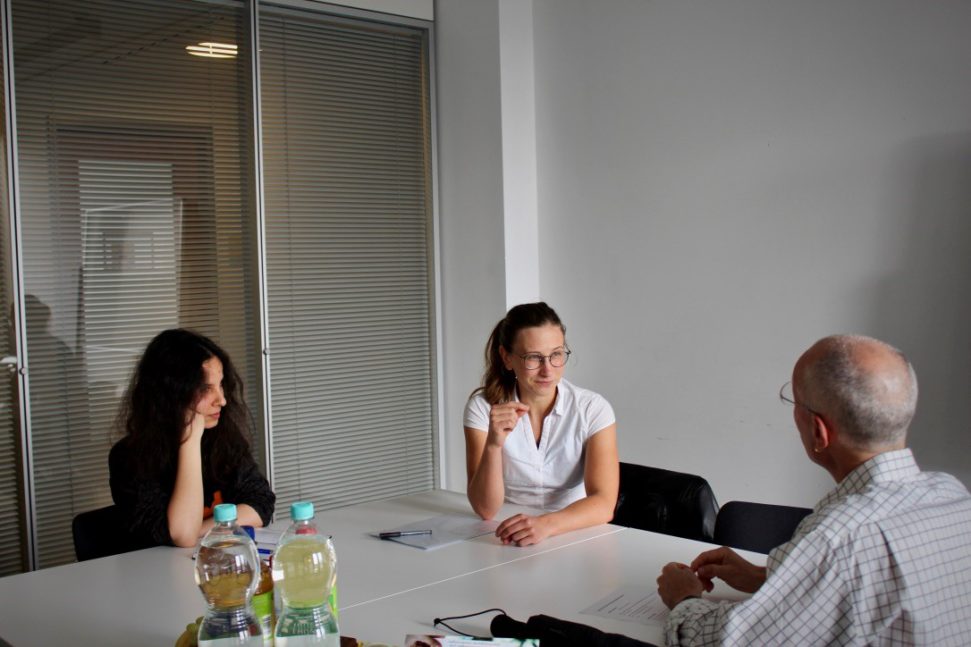News & Events
News & Events-Archiv 2019
November 27th, 2019 Global Leadership Center Roundtable in St. Louis
On November 6 & 7, 2019 the second annual meeting of the Global Leadership Center Roundtable took place at Washington University in St. Louis (MO). Stuart Bunderson and Marcianne Gagliardi from the Bauer Leadership Center at Olin Business School were the organizers of this year’s meeting that brought together the following participants:
• Janka Stoker and Harry Garretsen from the leadership center In the LEAD at the University of Groningen
• Ben Kuipers from the Leiden Leadership Centre
• Christian Bøtcher Jacobsen from the Crown Prince Frederik Center for Public Leadership at the University of Aarhus
• Eva Bracht and Michael Kosfeld from the Center for Leadership and Behavior in Organizations (CLBO) at Goethe University Frankfurt
• Vyla Rollins from the Leadership Institute at London Business School
• Stuart Bunderson and Marcianne Gagliardi from the Bauer Leadership Center at Olin Business School, Washington University in St. Louis
The Global Leadership Center Roundtable is a new initiative that started with the first meeting at the University of Groningen last year. Its objective is to foster interaction between research-driven leadership centers in the world and benefit from the exchange of experiences and best practices at the different centers. This year – besides the discussion of exciting new research – the focus was on different “theories and models of leadership” that are used at the different centers. The next meeting is going to take place in November 2020 at the Crown Prince Frederik Center for Public Leadership in Aarhus.
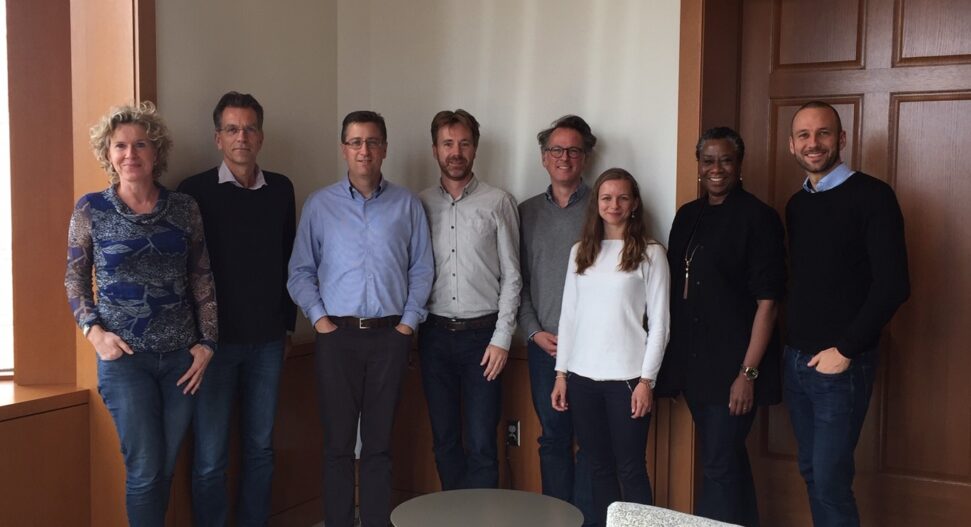
From left to right: J. Stoker, H. Garretsen, S. Bunderson, B. Kuipers, M. Kosfeld, E. Bracht, V. Rollins, C. Jacobsen
November 21st, 2019 Study about the German police force
A new study explores the trustworthiness of applicants to the German police force. Here you can find a report about the article.
Nicht nur in der Forschung, sondern auch in der Praxis rückte die Führungskräftegesundheit vermehrt in den Fokus. In einer kürzlich veröffentlichten Meta-Analyse haben Antonia Kaluza und Rolf van Dick von der Goethe Universität Frankfurt zusammen mit Wissenschaftlerinnen der Christian-Albrechts-Universität zu Kiel und der Universität Koblenz-Landau die bisherigen Erkenntnisse dieses noch recht jungen Forschungsfeldes theoretisch und empirisch zusammengefasst. In einem Interview im Uni-Report beantwortet Antonia Kaluza Fragen zu der Studie. Das Interview finden Sie hier.
Antonia J. Kaluza, Diana Boer, Claudia Buengeler & Rolf van Dick (2019). Leadership behaviour and leader self-reported well-being: A review, integration and meta-analytic examination, Work & Stress. DOI: 10.1080/02678373.2019.1617369
Angestoßen durch das Urteil des Europäischen Gerichtshofs am 14. Mai 2019, nach dem Arbeitgeber verpflichtet sind, die gesamte Arbeitszeit ihrer Beschäftigten systematisch zu erfassen, führten wir im Mai und Juni 2019 eine Befragung durch. Der Fragebogen wurde online von 864 Teilnehmern beantwortet, darunter Beschäftigte aus Firmen ganz unterschiedlicher Branchen sowie Behörden und andere Organisationen. Unter den Befragten waren 62% Männer, 46% haben Führungsverantwortung und das Alter bildet nahezu einen Querschnitt der sozialversicherungspflichtig Beschäftigten in Deutschland ab.
Das sind die Kernergebnisse:
1. Die Befragten verteilen sich auf zwei große Pole. Die Hälfte erfasst ihre Arbeitszeit nicht, hat also Vertrauensarbeitszeit während ein Drittel die gesamte Arbeitszeit erfasst – egal wann und wo diese erbracht wird.
2. Beide Gruppen „verteidigen“ ihr jeweiliges Modell. Von denjenigen, die in Vertrauensarbeitszeit beschäftigt sind, möchte nur eine Minderheit, dass die Arbeitszeit erfasst wird. Umgekehrt wünschen sich zwei Drittel der Befragten mit Vollerfassung diese auch für die Zukunft.
3. Männer haben häufiger Vertrauensarbeitszeit als Frauen und sind auch etwas zufriedener als Frauen mit der Art der Erfassung. Männer haben auch häufiger Führungsverantwortung. Wenn man aber den Effekt der Führung herausrechnet, bleibt ein Geschlechtseffekt zugunsten größerer Zufriedenheit der Männer mit der Erfassung bestehen.
4. Gefahr der (Selbst-)Ausbeutung ist präsent. Von den Befragten mit Vollzeit–erfassung möchten nur wenige auf Vertrauensarbeitszeit „umsteigen“ – hier werden wohl eher negative Effekte im Sinne von (Selbst-)Ausbeutung erwartet. Überraschend: Dies gilt insbesondere für Frauen, die sich keine stärkere Flexibilisierung wünschen, um Beruf und Familie vereinbaren zu können.
5. Allgemeine Arbeitszufriedenheit hat positiven Einfluss. Die Zufriedenheit mit der Erfassung bzw. der Vertrauensarbeitszeit hängt generell zusammen mit der Zufriedenheit und Identifikation mit dem Unternehmen.
Unser Fazit: Das Thema polarisiert. Zugleich scheint die Bereitschaft zur Veränderung gering – egal für welches neue Konzept zur Erfassung der Arbeitszeit. Ein bestimmtes Modell wird weder der Realität noch den Wünschen und Erwartungen gerecht. Unternehmen sollten - gestützt auf Daten (z.B. eigene Umfragen) - passgenaue Lösungen entwickeln.
Die vollständigen Ergebnisse können Sie hier kostenlos herunterladen.
June 8th, 2019 “For a fact-based worldview” – Visit and talk from Mikael Arevius, affiliate of the Gapminder foundation
Part of the lecture series titled “Ist die Welt schlecht? Is the world bad?”
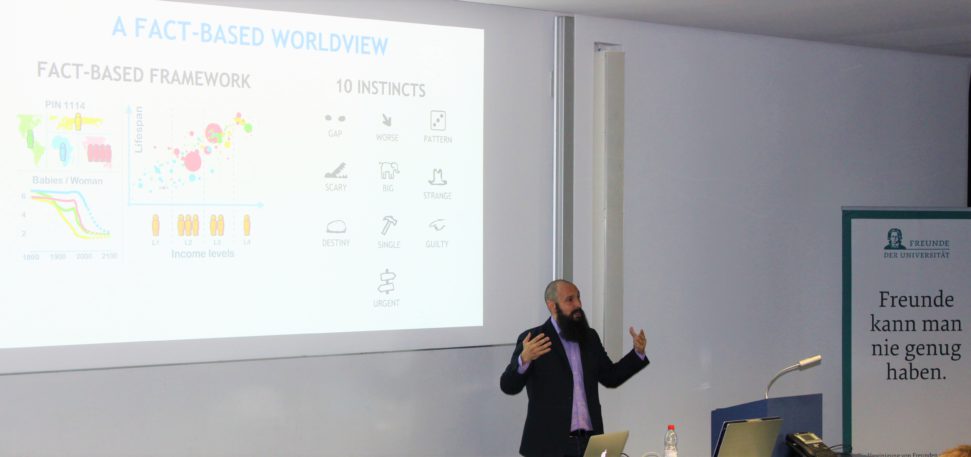
The lecture series titled “Ist die Welt schlecht?” continued with the second seminar carried out by the speaker Mikael Arevius. These lectures, organized by Prof. Rolf van Dick and funded by the association of Goethe University’s friends and supporters and the Grunelius Foundation, tried to provide a deeper insight into the progresses made by humans and into the world’s general condition. Its goal is to challenge the audience to think outside the box and to provide information in order to answer the main question: is the world bad?
Nowadays, we are misled into believing that, despite the technological progresses, the world is still governed by chaos and violence and it might seem that life on planet Earth is not better than it was in previous centuries. However, during his visit at the Goethe University Frankfurt, Mikael Arevius provided data to challenge this idea. Mikael Arevius started his career as a school teacher in Sweden. Subsequently, he expanded his knowledge in different areas, such as education and leadership. His experience and his inclination to create teaching tools and materials led him to collaborate with Gapminder. Gapminder is a Swedish foundation created by Hans Rosling, which provides statistical data from all over the globe. Gapminder, on the basis that there is a subtle ignorance regarding the facts of the world, aims to promote a greater awareness about global data, which are not always looked from the correct perspective.
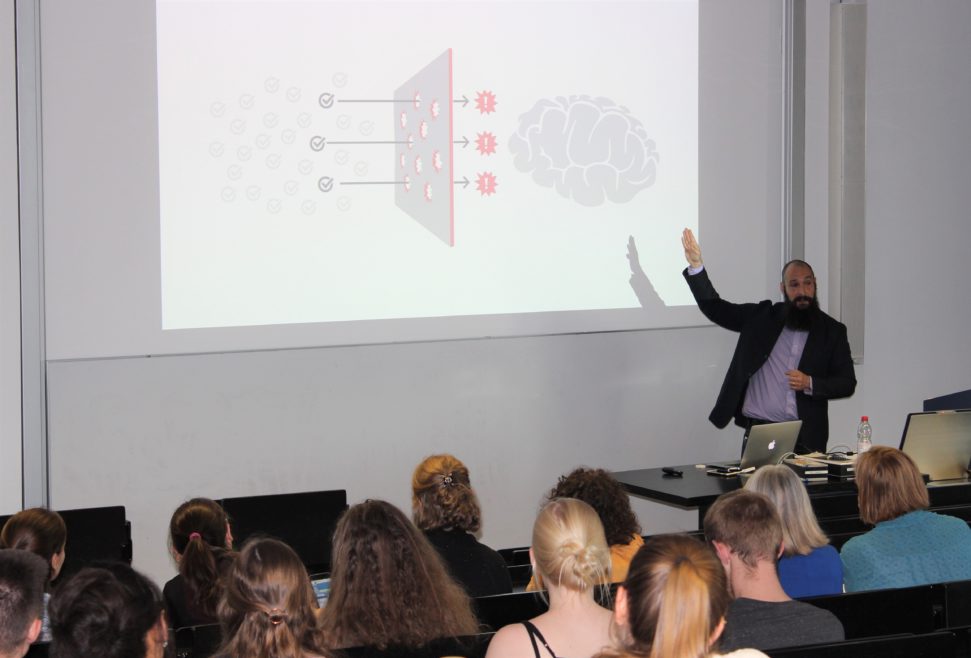
In the course of the lecture series “Is the world bad?”, Mikael Arevius visited the Goethe University Frankfurt. Besides a small group meeting, he gave a talk “For a fact-based worldview”. This lecture was interactive, indeed, the audience was asked to actively participate in the talk by answering a survey of four questions at the beginning of the lecture. The four questions were related to global facts and the total score of the audience was used by the speaker later in the talk to argument his ideas. After taking part in the survey, Mikael Arevius started the discussion highlighting how poorly people, normally, score in questionnaires like the one done at the beginning of the talk. In fact, people answering a 12-items questionnaire generally score less than 33%, which is, statistically speaking, the minimum percentage of correct responses if the answers were chosen randomly. The fact that people score less than 33% suggests that there is a shared ignorance regarding facts about the world.
Many examples were used to show to the audience the existence of a subtle ignorance about global facts. Furthermore, one striking illustration of the importance to look at trends and not just at the latest data was regarding the presence of women in politics. Nowadays, the percentage of women in political settings is about 23%, which is not a high percentage. However, Mikael Arevius showed that, compared to previous years, there was a significant growth of women in politics. The talk continued by showing interesting data about the general evolution of the world and its population. Remarkable was the use of teaching tools. Indeed, Mikael showed different animated bubble charts that aided the understanding and interpretation of statistical data. His material can also be found online, and it is free to the public.
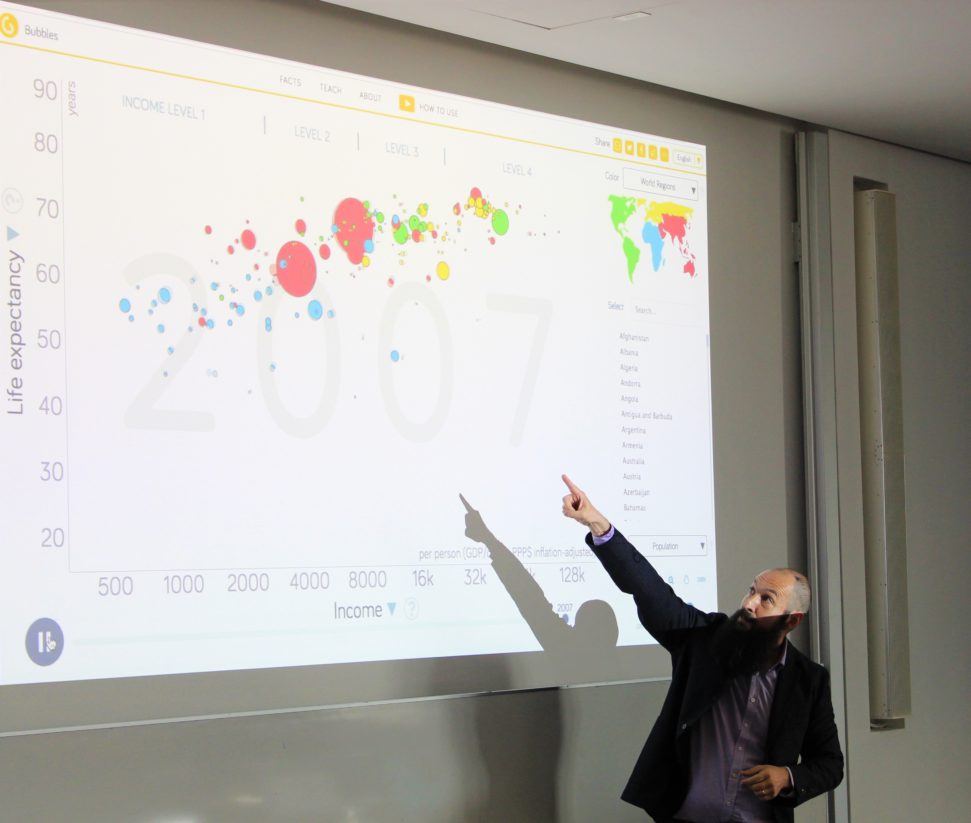
In conclusion, the talk by Mikael Arevius was very inspiring and gave a new insight into global data and their interpretation. His visit was part of a series of lectures on the future, which was donated by the association of friends and supporters of Goethe University to celebrate their 100-year anniversary and funded by the Grunelius foundation. Thus, this special gift to the university and the citizens of the city offered a wonderful opportunity to take a different look at the world.
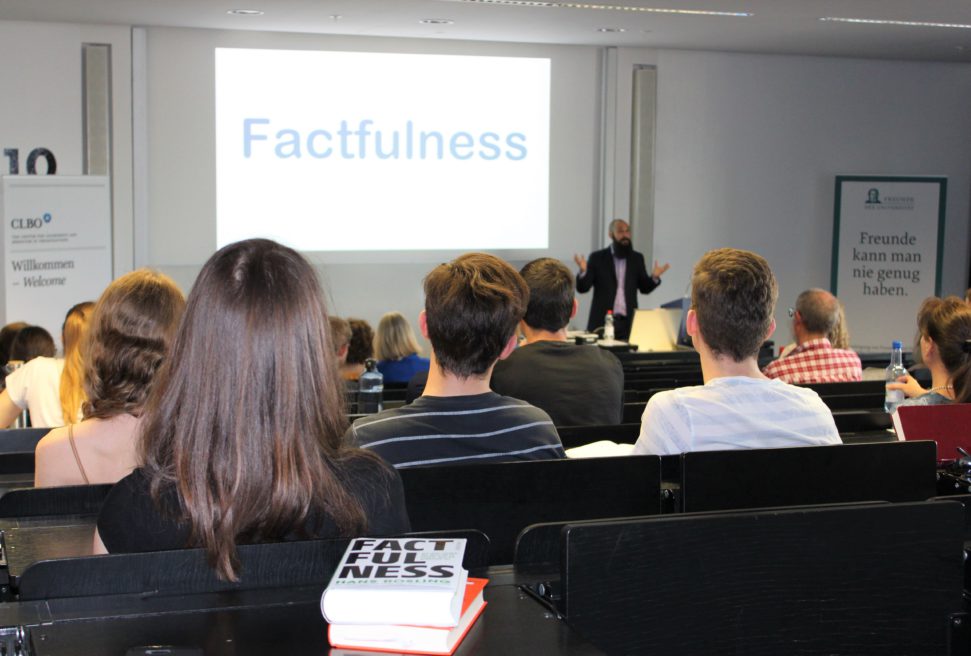
Start of the lecture series “Ist die Welt schlecht? Is the world bad?”
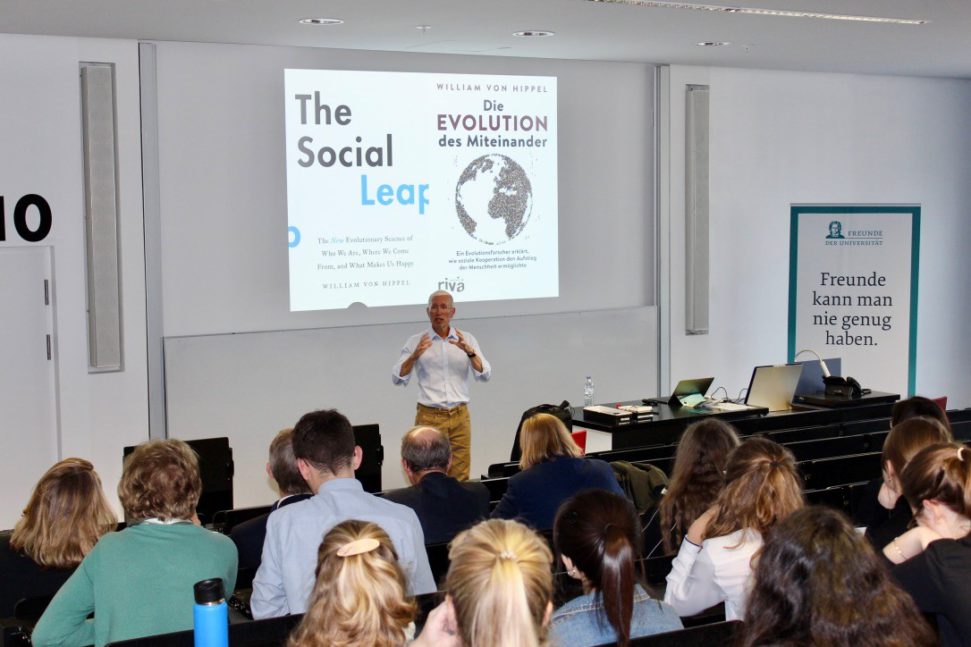
„Is the world bad?“ is the main question within the lecture series organized by Prof. Rolf van Dick with the contribution of friends and supporters of Goethe University and funded by the Grunelius Foundation. When we watch the news, read the newspaper or screen the social media, we are confronted with disasters, crises and terrorism. And this can easily lead to the impression that the world is getting worse and worse and that everything was better in the past. However, a lot has changed to the better over the past years. The aim of this lecture series is to put things into perspective and to look at the positive side and at the advancements that we have made in the past years.
The start of the lecture series was made by Prof. William von Hippel, who visited the Goethe University from May 20th to 22nd. During his permanence in Frankfurt, he gave a talk about „The social leap“, from which he offered some ideas to answer the important question: „ Is the world bad?“. Prof. William von Hippel received his PhD in social psychology at the University of Michigan. He then was an assistant and associate professorship at Ohio State University. Currently, he is Professor of Psychology at the University of Queensland in Brisbane, Australia. His research interests include evolutionary psychology, executive functioning and social competences.
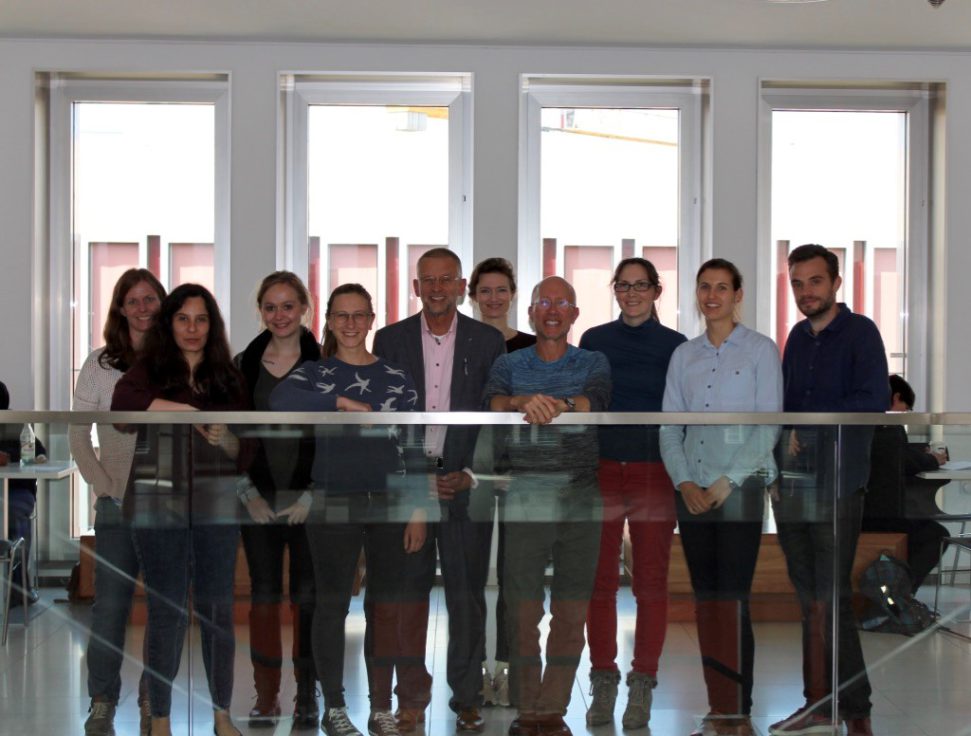
During his stay, Prof. William von Hippel met up with PhD students, postdocs and professors from different departments of the Goethe University. For example, he discussed research questions with members of the Department of Psychology, had meetings with members of the Faculty of Economics and Business Administration and exchanged ideas with members of the Department of Management and Microeconomics. Besides personal meetings, several small group meetings took place like a stimulating discussion with the interdisciplinary collaborative network “Resilience Factors in a diachronic and intercultural perspective” where researchers from archaeology, psychology and life sciences examine which factors enable individuals, smaller or larger collectives to cope with stressful situation in the past.
The highlight of his visit at the Goethe University was his talk about “The social leap”. He began his talk from the evolution of our distant ancestors that encouraged a “social leap” from the rainforest to the savannah. Indeed, they prioritized teamwork over physical competences in their struggle for survival, creating a new form of social intelligence that shaped humanity’s way from the apex predator. He then built a bridge between our evolutionary history over the last 6 million years and some of the fundamental aspects of our lives today. For example, he highlighted how cooperation and kindness make us more effective killers, indicating that this can be seen both as a threat and as an opportunity. In addition, he theorized how for example with the aid of modern medicine and knowledge about the environment, the world got cleaner and safer and people became healthier and older. He concluded his inspiring talk with possible explanations about the reasons why people are not so much happier even though the world has progressively become better.
Altogether, it was an interesting and inspiring visit and a great start for the lecture series which was made possible by the association of Goethe University’s friends and supporters and the Grunelius Foundation who supported this lecture series - without their financial support this event would not have been possible. Many contacts were made and collaborations were planned for further projects. Prof. William von Hippel concluded that he had enjoyed his stay in Frankfurt very much and that he would like to come back during his sabbatical next year.
